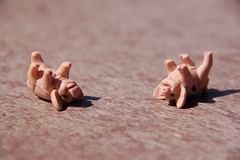Nearly five years after becoming a parent, the extent to which all parents are teachers keeps becoming clearer day by day. Depending on the knowledge of the parents, some subjects are best left to formal education (Art if the parents are engineers, Math if the parents are artists, for example). Sometimes, though, it's hard to curb a child's curiosity, and you find yourself in a corner looking for a quick exit. Tonight, while reading a
book based on American Indian legend, Ben asked why there weren't any people in the story, and in my attempt to explain evolution to a five-year-old I'm pretty sure I left him imagining monkeys swinging through the jungle with human babies clinging to their fur. Oh well, better that than the alternative.
Other lessons parents offer are purely practical, like the fact that fire is hot and you'll get hurt if you touch it. Yesterday I was discussing corporal punishment with a friend, and we shared the view that some lessons require it in order to drive the point home. What do you do when your child reaches out toward a burner on the stove? Scold him? Let him burn himself? The former is woefully inadequate, and the latter is excessive (not to mention likely to earn you a file down at the child welfare agency).
The way I see it, some situations call for artful emotional scarring - something that will put The Fear in them such that further instruction is unnecessary. It's for their own good, of course. When discipline is generally administered through scolding and time-outs, a spanking might be the best way to send a message with the desired force; a
little physical harm is intended to prevent a
lot of physical harm. Sometimes a serious discussion might suffice if the danger is not imminent. This morning another friend of mine told me about a coworker who wanted to make sure her son never left her side while out in public, so she told him the story of
Adam Walsh, the boy who was kidnapped and found murdered, and whose father went on to host American's Most Wanted. Now I'm not exactly sure how old her son was at the time, but that might be a bit too much emotional scarring for a kid to handle. Especially when you leave in details like decapitation. It apparently worked, but I can't help but wonder how the kid sleeps at night.
Sometimes the hardest lessons are the most subtle. Living in Washington, DC, Ben and Ian have probably seen more demonstrators than I did in my entire life before college. How do you explain war to a child? Whenever I try something like that, I feel like Mister Rogers on Xanax, attempting to explain suffering in happy terms. When Ben overheard me telling Sarah about today's murderous rampage at Virginia Tech, describing the killer as "not a nice person" who "hurt some people" seemed like the grossest understatement I'd ever made. There are some things you just don't want to know, kid.
Of course, not all the difficult lessons are depressing. Many are difficult because they're best taught by example. Not wanting to give my boys the impression that aggressive behavior and name-calling are appropriate, I've had to dial down the road rage during the daily commute and keep certain sentiments to myself. Which is hard in a city where the level of asshatted driving goes up to 11.
Last week we started reading
Charlotte's Web before bedtime. Death is one of those difficult subjects, and I'm hoping the story will help Ben conceptualize certain facts of life. It might just turn him into a vegetarian, though. And here I was hoping that he'd at least be in high school before he started to guilt-trip me for my personal vices. Anyway, sometimes the challenging subjects have to do with the type of person I strive to be, and strive to raise my children to become. Tonight I finished a couple of short chapters, and told him that tomorrow we'd read Chapter Nine, "Wilbur's Boast."
"What's a boast?" Ben asked.
"Ummmm... a boast is when you talk too much about how good you are at something."
"..."
"Say you're really good at drawing (which you are). It's okay to tell people that you really enjoy drawing, but it's not really polite to always tell everyone that you're a really good drawer."
"Why is it not polite?"
"Well, if you tell someone you're really good at something, it might make them feel bad if they can't do it as well. What if someone told you they were a really good painter, and you weren't as good at painting? Would that make you feel bad?"Ben shook his head and said,
"It would make me want to be a better painter." Here I am trying to teach modesty, and Ben comes back with soundbites from a motivational seminar. I don't know whether to feel proud of his self-assuredness and eagerness to learn, or afraid of his budding megalomania. I went with pride, telling him that was a good way to think about it, and he should always want to keep learning and practicing in order to succeed.
I can always tell when Ben is turning things over in his mind, because he gets quiet and still, and he's content to have me leave his bedroom without objection. Tonight was one of those nights. I don't know what he'll make of my efforts to teach him certain things, and who knows what the future holds, but these are the occasions when the responsibility of parenting really bears down on me. My only hope is that I get it right more often than I screw it up. And that my kids don't turn out Republican.
